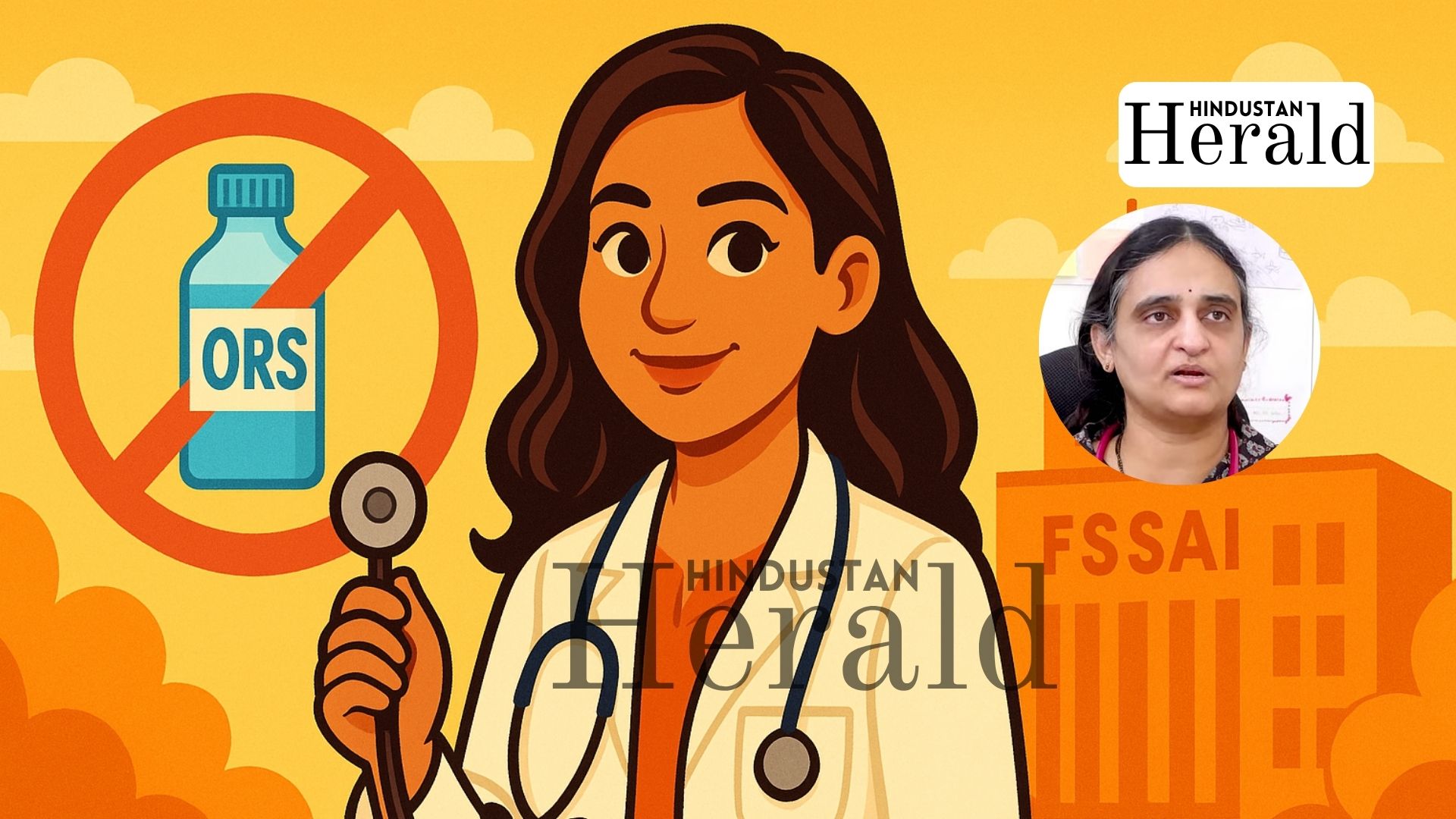Hyderabad, October 18: When Dr Sivaranjani Santosh walked into her clinic eight years ago and saw a child who’d grown weaker after being given a so-called “ORS drink,” she didn’t imagine it would spark one of the longest regulatory battles in India’s food industry. This week, that fight finally ended.
The Food Safety and Standards Authority of India (FSSAI) has now banned the use of “ORS” on any food or beverage label, cutting through years of corporate loopholes and marketing spin. For Dr Santosh, a Hyderabad paediatrician who took on the country’s biggest beverage brands almost single-handedly, the decision isn’t just a legal win. It’s deeply personal.
A Doctor’s Warning That No One Wanted to Hear
Back in 2017, Dr Santosh started noticing a worrying pattern. Parents were walking into her clinic, confident they’d done the right thing by giving their sick child something called “Fruit ORS” or “ORS+ Energy Drink.” The packaging looked medical. The word “ORS” was right there in bold. But the children weren’t recovering; some were getting worse.
What those parents didn’t know, and what most people wouldn’t, was that these bottled drinks had nothing to do with Oral Rehydration Solution, the lifesaving mix of salts and glucose recommended by the World Health Organization for treating dehydration. Instead, they were sugar-heavy beverages sold in supermarkets, not pharmacies.
“It broke my heart,” she told India Today earlier this week. “A parent thought they were saving their child, but that bottle could actually make dehydration worse.”
She began calling out companies publicly, first on social media, then through awareness campaigns. By 2018, her posts were being shared by doctors around the country. But the regulators didn’t act not yet.
When the Law Lagged Behind
In 2022, under pressure to respond, FSSAI issued a rule allowing companies to continue using the term “ORS,” as long as they printed a disclaimer: ‘This is not a WHO-recommended ORS formula.’
To the medical community, that sounded absurd. “You can’t sell fake medicine with a footnote,” one pediatrician commented at the time. Still, the rule stood, and the shelves stayed full of misleading products.
Frustrated, Dr Santosh turned to the courts. In September 2024, she filed a Public Interest Litigation (PIL) in the Telangana High Court, accusing the FSSAI of failing to protect public health. Her petition included photographs of product labels and case notes from children who had consumed these drinks.
Few expected it to go anywhere. But she persisted, documenting, speaking, writing, and meeting whoever would listen.
The Breakthrough
Then came October 14, 2025. In a new order that effectively rewrote the rules, FSSAI banned the use of “ORS” altogether not just as a standalone term, but in any form, prefix or suffix, across all beverage and food categories.
The decision immediately cancelled earlier permissions granted in 2022 and 2024. Companies can no longer use “ORS” as part of a brand name, slogan, or even a registered trademark. Any violation will now count as misbranding and misleading advertisement under the Food Safety and Standards Act, 2006.
For public health advocates, it was a breakthrough. For beverage makers, it was a warning shot.
“We Have Won It”
Within hours of the announcement, Dr Santosh posted a short video on Instagram, tears streaming down her face. “We have won it,” she said simply, clutching the printed copy of the FSSAI directive.
Her story spread quickly. A paediatrician from Hyderabad had gone up against the combined weight of the food and beverage industry and forced a change in national policy. In her words to Hindustan Times, “It’s a huge relief. Now I know that no child will die or be misled because of these drinks.”
For the first time, she allowed herself to breathe.
What the Ban Really Means
To most consumers, the difference between a packet of medical ORS and a colourful “hydration drink” might seem trivial. But medically, it’s not. The WHO formula used for decades to fight diarrhoeal deaths is precise: 75 mEq of sodium, 75 mmol of glucose, and 20 mEq of potassium per litre. Change that balance, and the solution can become useless, even dangerous.
By removing the “ORS” tag from consumer beverages, the FSSAI is trying to close that gap to make sure no one mistakes a sugary sports drink for a medical treatment.
Public health experts say it’s a step that should have come years ago. “The fact that we needed a court case to enforce something this basic shows how casually we let marketing blur the lines between medicine and food,” said one senior health official, requesting anonymity.
The Industry Fallout
For the companies involved, the new rule will sting. According to The Economic Times, several beverage makers will have to rebrand entire product lines, replace packaging, and refile trademarks. Industry insiders admit the order could cost crores, especially for products already distributed across rural markets.
But the regulator isn’t budging. The FSSAI has directed state and union territory food safety officers to immediately monitor compliance. The message is clear: no more using “ORS” as a marketing hook.
Some in the industry are quietly discussing legal options. Others are reportedly exploring rebranding with new terms like “Hydro Boost” or “Electro Mix.”
A Turning Point for Consumer Protection
India’s food regulation system has been criticised for being reactive, not proactive. This ruling might signal a change. It’s one of the few instances where grassroots medical advocacy directly reshaped national policy.
The move also positions India alongside countries like Bangladesh and Thailand, which have already restricted the use of “ORS” terminology outside approved medical formulations.
Still, the real test lies ahead in enforcement. Will every local manufacturer, every corner store, and every online retailer follow through?
Dr Santosh hopes so. “I’ve done my part,” she said in a short message on Thursday night. “Now it’s up to the system to make sure this victory means something on the ground.”
Beyond the Win
For a long time, she was just “that doctor from Hyderabad” writing open letters to regulators. Today, she’s being hailed as a public health crusader. Yet when asked how she feels, she only smiles.
“It’s not about fame,” she said. “It’s about one simple truth if something says ORS, it should actually save lives, not risk them.”
And perhaps that’s what makes this story matter most: in a system where regulation often bends to power, it took a lone voice, grounded in medicine and persistence, to remind everyone what those three letters O, R, and S really stand for.
Stay ahead with Hindustan Herald — bringing you trusted news, sharp analysis, and stories that matter across Politics, Business, Technology, Sports, Entertainment, Lifestyle, and more.
Connect with us on Facebook, Instagram, X (Twitter), LinkedIn, YouTube, and join our Telegram community @hindustanherald for real-time updates.
Covers Indian politics, governance, and policy developments with over a decade of experience in political reporting.






